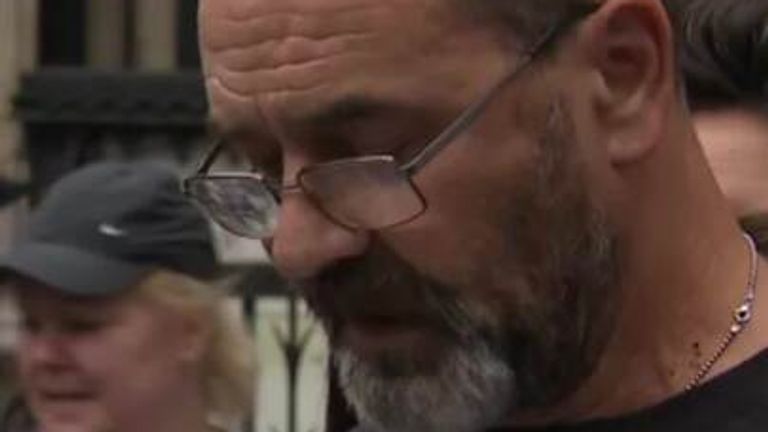Sir Keir Starmer has been urged to “say something” about the case of a man who spent 17 years in prison for a rape he did not commit before having his conviction overturned.
Former justice secretary Robert Buckland has said the Labour leader – who was director of public prosecutions (DPP) and head of the CPS from 2008 to 2013 – should also co-operate with any potential public inquiry into what has been described as the “total public mess” caused by the miscarriage of justice.
Andrew Malkinson was found guilty of raping a woman in Greater Manchester in 2003 and the next year was jailed for life with a minimum term of seven years.
He remained in jail for another decade because he maintained his innocence.
Last month he had his conviction quashed by the Court of Appeal after DNA evidence that linked another man to the crime was produced by his defence team.
Case files obtained by the 57-year-old, seen by Sky News, show that officers and prosecutors knew forensic testing in 2007 had identified a searchable male DNA profile on the rape victim’s clothing that did not match his.
Notes of a meeting between the Forensic Science Service, the CPS and Greater Manchester Police (GMP) in December 2009 – a year into Sir Keir’s tenure – suggest the CPS understood the possible importance of the 2007 DNA find.
There is no suggestion that Sir Keir had any involvement in the case or was personally aware of it.
However, Mr Buckland told Sky News: “Some comment from Sir Keir Starmer would be welcome.
“The DPP isn’t going to be over every case – but the prime minister has spoken about it, the lord chancellor has spoken about it and the only people we have not heard from are Labour and Keir Starmer,” the former justice secretary added.
“I would have thought it would be good for Sir Keir as a former senior lawyer to say something about it and to say he will co-operate with any public inquiry.”
As director of public prosecutions, Sir Keir was the country’s top prosecutor at the time.
As operational decisions are taken at a regional level – his role as head of the CPS has come under scrutiny in light of previous statements he has made.
In April, the Labour leader told Sky News he took “full responsibility for every decision of the Crown Prosecution Service when I was director of public prosecutions”.
“When I was director of public prosecutions, it meant that when we succeeded in some very important prosecutions, as we did… I took the credit for that on behalf of the organisation,” he said at the time.
“Where we got it wrong, I carried the can.”
Sir Keir is yet to make a public comment on Mr Malkinson’s case – which was prosecuted before he joined the CPS – but his deputy, Angela Rayner, told Sky News there had been an “appalling miscarriage of justice” when asked about the timing of the DNA discovery.
“There are serious questions to ask about why that information wasn’t provided and that they didn’t go after the real perpetrator, who of course was then free to carry on doing these horrendous crimes,” she added.
CPS guidance states it must write to the body responsible for investigating possible miscarriages of justice, the Criminal Cases Review Commission (CCRC), “at the earliest opportunity about any case in which there is doubt about the safety of the conviction”.
But the case files show both the police and the CPS chose to take no further action and there is no record the CPS directly informed the CCRC.
The CPS claims Mr Malkinson’s lawyers were informed directly of the new DNA evidence.
The CCRC refused to order further forensic testing or refer the case for appeal in 2012, with the case files citing fears about costs.
Click to subscribe to the Sky News Daily wherever you get your podcasts
Mr Malkinson’s case was described as “astonishing” by former solicitor general Lord Edward Garnier KC, who said there should be an inquiry into the “total public mess” that has unfolded following his exoneration.
He said it was a “terribly bad and shocking case and we should be ashamed of what has happened” and that a public inquiry needs to report within six months and be led by someone of “considerable stature and independence”.
A CPS spokesperson said: “It is clear Mr Malkinson was wrongly convicted of this crime and we share the deep regret that this happened.
“Evidence of a new DNA profile found on the victim’s clothing in 2007 was not ignored. It was disclosed to the defence team representing Mr Malkinson for their consideration.
“In addition, searches of the DNA databases were conducted to identify any other possible suspects. At that time there were no matches and therefore no further investigation could be carried out.”
Read more:
Miscarriages of justice body to review handling of wrongful rape conviction
Police ‘knew DNA on rape victim’s clothes didn’t match’ man who was convicted and put behind bars for 13 years
In light of the revelations, the CCRC has said it will review Mr Malkinson’s case.
A spokesman said the commission would be as “open as we can be within our statutory constraints” about “lessons to be learned”.
“We recognise that Mr Malkinson has had a very long journey to clear his name and it is plainly wrong that he spent 17 years in prison for a crime he did not commit.
“We have already been in touch with Greater Manchester Police and with the Crown Prosecution Service to offer our assistance in any of their inquiries.”
The Labour Party has been approached for comment.
The Attorney General and the Home Office both declined to comment.

